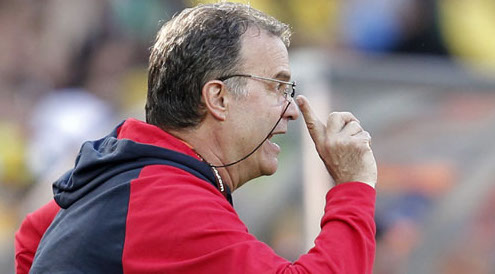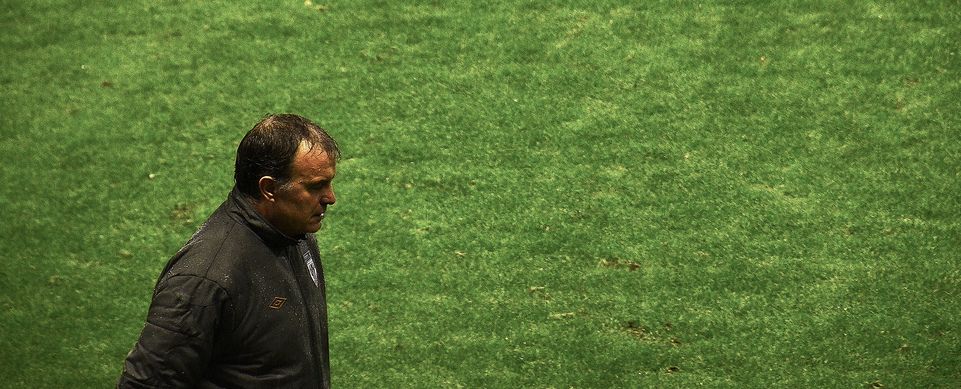By Henry Edwards, Sport Editor and third year History student
With Brexit, the Chinese Super League and Spygate dominating debates surrounding football in recent weeks, why do we persist with looking at ourselves through rose-tinted glasses?
For any of you who have been keeping up to date with the January sports news, you don’t need me to tell you about how much ‘Spygate’ dominated the back pages. The story concerning Leeds United manager Marcelo Bielsa admitting to sending a ‘spy’ to view Derby County train ahead of their match up was discussed by seemingly every football pundit under the sun.

Bielsa, a highly influential Argentine manager who is often credited for inspiring figures such as Manchester City’s Pep Guardiola and Tottenham’s Mauricio Pochettino, stated that he has sent members of his staff to view every Championship side train. In a remarkable hour-long PowerPoint presentation, in which he walked a handful of journalists through the process of gathering information ahead of individual games, he stated that studying training sessions is useful mainly to keep his mind at ease and justify what he has already deduced.
Frankly, the reaction to this issue has been nothing short of ridiculous. Derby County manager Frank Lampard, despite claiming that he would have taken offence to it regardless of the result, duly lapped up the chance to blame his side’s eventual 2-0 defeat at Leeds on the incident. The former-Chelsea midfielder commented that on a sportsmanship level it is wrong. He criticised Bielsa for failing to ‘abide by the etiquette’ of this nation. Bielsa himself stated that in a conversation with Lampard, the Derby boss said to his counterpart that he ‘didn’t respect the fair play rules.’ Hapless pundits Ray Parlour and Martin Keown were quick to jump on the bandwagon. The former labeled it ‘totally wrong’, while Keown described the act ‘morally outrageous.’
🕵️♂️ Stuart Pearce thinks the EFL should reverse the result of @LUFC win over @dcfcofficial after the spygate row...
— Sporting Life Football (@SportingLifeFC) January 16, 2019
🤔 Thoughts?#LUFC #DCFC #SpygateLeeds pic.twitter.com/EdVFzxACbo
Let’s get one thing clear: what Bielsa did is not wrong. There is no rule or law stating that football clubs cannot do what Leeds did. The ‘spy’, as the individual is being described, was stood on public ground peering in. The BBC reported that Derbyshire Police found that there was zero damage to the fence and that no arrest was made. Clearly if it means so much for teams to train in private, then perhaps they could invest a fraction of their millions of pounds on something that may obscure the vision of onlookers. A wall, perhaps.
Now because Bielsa has admitted to using spies to gather information in every country he’s managed, this issue has spiralled into a question of national culture. Lampard, Parlour and Keown, among many others, have essentially arrived at this conclusion: ‘Well, maybe your shady foreign mischief is excused overseas, but it will not stand here on this sacred isle. We, after all, are gentlemen.’
"We don't like that kind of thing in our leagues. We don't want it to be encouraged" @Dean36ashton10 believes there should be a sanction for #LUFC boss Marcelo Bielsa following spygate 👁#EFLonQuest @LUFC @TheSquareBall @LeedsUtd1992 #DCFC @SNicholsonDT pic.twitter.com/XUKfEGfHz2
— Quest (@QuestTV) January 12, 2019
We as a nation consistently apply this flawed logic when discussing the latest goings on. Every World Cup a foreign team or players are lambasted by England fans for being ‘unsporting’: in 2006 it was Ronaldo’s Portugal and more recently in 2018 Colombia were vilified.
Our perceptions of the Premier League become hilariously skewed thanks to our nationalistic imbued goggles. We consider it to be the best league in the world, despite an English team failing to win the Champions League since Chelsea’s rather bizarre 2012 victory. We doubt foreign players and managers; indeed, one of the enduring questions posed by little Englishmen at figures in the mould of Messi has always been ‘can he do it on a cold windy night in Stoke? You know, can he play proper football?’
The transfer saga involving West Ham’s want-away striker Marko Arnautovic’s potential move to the Chinese Super League has thrown up the same type of thoughts. British fans cannot seem to fathom why any footballer would not want to play in the Premier League, and brand any footballer that moves to China a gold-digger. This is presumably said while completely forgetting the commercial nature of Britain’s top-flight – this is a league that recently gave departing executive chairman Richard Scudamore £5 million as a goodbye present. The financial power of every Premier League club has reached a state of enormity: lowly Bournemouth can afford to splash £19 million on an unproven Liverpool striker who is unlikely to even start. How dare we criticise China for merely trying to emulate our indulgence.
Cardiff City manager Neil Warnock got himself in the news recently for voicing his support of Brexit. He stated his belief that Britain would be better ‘in every aspect’, before inexplicably stating ‘to hell with the rest of the world.’ Warnock’s nationalistic arrogance is increasingly becoming the norm in these troubled times. We come to sport to escape reality, and yet these off-the-field debates have become tinged with naïve pro-Brexit rhetoric and beliefs. Climbing down from our high horses and questioning our bigoted and undeserved righteousness are steps many of us should take.
Jamie Carragher & Neil Warnock leave behind the football analysis to share their strong opposing views on....Brexit?
— BBC Sport (@BBCSport) January 13, 2019
Watch: https://t.co/HJehmXQZrg pic.twitter.com/22tK1zhlHa
Flickr/ Martin P. Szymczak
What did you make of the Bielsa story, and do you think it reveals underlying issues concerning nationalism in sport? Let us know.









